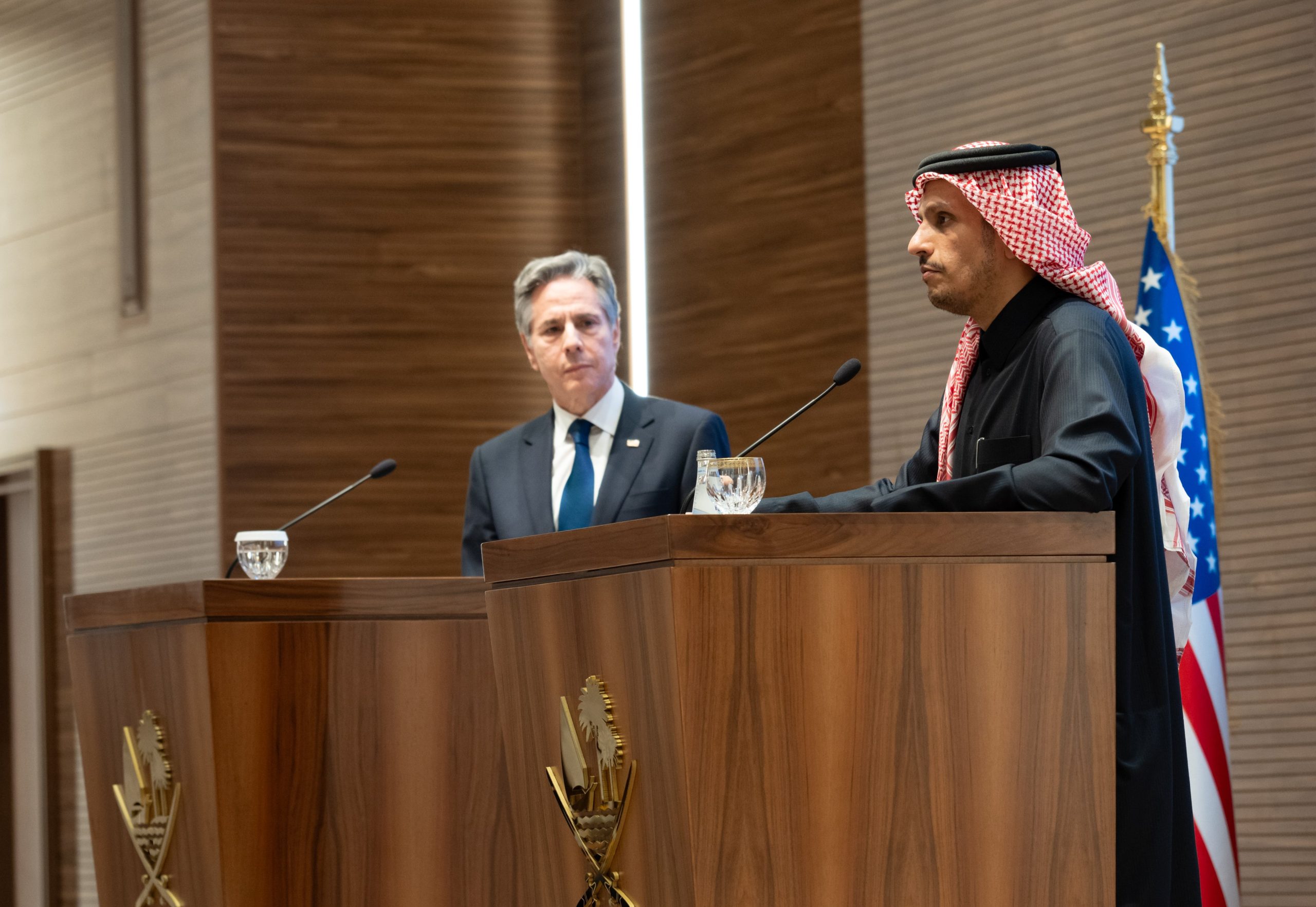The Red Sea’s escalations have been on the rise since Houthi rebels captured the Galaxy Leader ship on November 19.
Qatar’s Prime Minister Sheikh Mohammed bin Abdulrahman Al-Thani described the escalations in the Red Sea as “unacceptable” on Sunday, noting that the Gulf state does not see military action as a solution.
Sheikh Mohammed’s, who is also Qatar’s foreign minister, remarks came in a joint press conference in Doha alongside the United States Secretary of State Antony Blinken, who is on his fourth regional visit since the beginning of the war in Gaza.
The press conference came following discussions between the two officials on the developments in Gaza, Lebanon, and the Red Sea among others.
When asked by the press about Qatar’s stance over the Red Sea escalations, Sheikh Mohammed said Doha’s “position is very clear on protecting the freedom of navigation.”
“What’s happening in the escalation in the Red Sea is something unacceptable[…] as I have mentioned, this is, unfortunately, one of the effects of what’s happening right now in Gaza, and we believe that it’s more important now to focus our efforts to reach an end and reach a resolution to the situation over there,” Sheikh Mohammed said.
Responding to a question over whether it is time for military action by a coalition, the Qatari diplomat said the Gulf state never sees a military action as a solution.
“From Qatar policy perspective, we never see a military action as a resolution. Of course, we see the events and what’s occurring over there in the Red Sea, but our biggest worry is to have consequences all the time that will keep us in a loop that will never end and will create a real tension in the entire region,” he explained.
The Red Sea’s escalations have been on the rise since Houthi rebels captured the Galaxy Leader ship on November 19, which is partially owned by an Israeli businessman. The Houthis carried out at least 12 similar attacks last year, according to U.S. Secretary of Defense Lloyd Austin.
The move marked a major escalation in the area and has forced vessels coming from the Israeli Red Sea port of Eilat to Asia, Australia or East Africa to divert its routes. The Israeli ships have to take a longer path and maneuver the Bab El-Mandeb Strait, consequently paying a heavy additional fee.
The move prompted the U.S. to launch Operation Prosperity Guardian on December 18, 2023, a coalition aimed at addressing “security challenges in the southern Red Sea and the Gulf of Aden.”
The operation includes the United Kingdom, Bahrain, Canada, France, Italy, the Netherlands, Norway, Seychelles and Spain.
At the time, Mohammed Abdel-Salam, the Houthis’ chief negotiator and spokesman, said the group would continue to attack Israeli-related vessels.
“The American-formed coalition is to protect Israel and militarise the sea without any justification, and will not stop Yemen from continuing its legitimate operations in support of Gaza,” he wrote on X.
The capture of the vessels also came after Houthi’s began launching ballistic missiles towards Israel on October 31 in response to the war on Gaza.
The Israeli occupation forces have killed at least 22,835 Palestinians in Gaza while injuring 58,416 others since October 7, according to the latest figures by the Strip’s health authorities.
After the beginning of Israel’s genocidal war on Gaza, Hezbollah also entered the arena, where southern Lebanon has since faced cross-border attacks between the group and Israel.
Lebanon’s Hezbollah and Yemen’s Houthis fall under what is known as the ‘Axis of Resistance’, an informal anti-Israel coalition.
Israel has killed more than 123 people in Lebanon, according to figures by the Lebanese health ministry, last updated on January 3.
Tensions in Lebanon increased following Israel’s killing of senior Hamas leader, Saleh Al-Arouri, in Beirut last week. To date, Israel has not claimed the attack despite Hamas, Hezbollah and Lebanese authorities confirming it was carried out by Israel.







